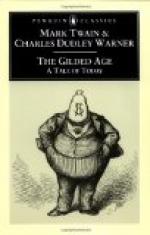He said that he was a member of the State legislature of the Happy-Land-of-Canaan; that on the --- day of ------ he assembled himself together at the city of Saint’s Rest, the capital of the State, along with his brother legislators; that he was known to be a political enemy of Mr. Dilworthy and bitterly opposed to his re-election; that Mr. Dilworthy came to Saint’s Rest and reported to be buying pledges of votes with money; that the said Dilworthy sent for him to come to his room in the hotel at night, and he went; was introduced to Mr. Dilworthy; called two or three times afterward at Dilworthy’s request—usually after midnight; Mr. Dilworthy urged him to vote for him Noble declined; Dilworthy argued; said he was bound to be elected, and could then ruin him (Noble) if he voted no; said he had every railway and every public office and stronghold of political power in the State under his thumb, and could set up or pull down any man he chose; gave instances showing where and how he had used this power; if Noble would vote for him he would make him a Representative in Congress; Noble still declined to vote, and said he did not believe Dilworthy was going to be elected; Dilworthy showed a list of men who would vote for him—a majority of the legislature; gave further proofs of his power by telling Noble everything the opposing party had done or said in secret caucus; claimed that his spies reported everything to him, and that—
Here a member of the Committee objected that this evidence was irrelevant and also in opposition to the spirit of the Committee’s instructions, because if these things reflected upon any one it was upon Mr. Dilworthy. The chairman said, let the person proceed with his statement—the Committee could exclude evidence that did not bear upon the case.
Mr. Noble continued. He said that his party would cast him out if he voted for Mr, Dilworthy; Dilwortby said that that would inure to his benefit because he would then be a recognized friend of his (Dilworthy’s) and he could consistently exalt him politically and make his fortune; Noble said he was poor, and it was hard to tempt him so; Dilworthy said he would fix that; he said, “Tell, me what you want, and say you will vote for me;” Noble could not say; Dilworthy said “I will give you $5,000.”
A Committee man said, impatiently, that this stuff was all outside the case, and valuable time was being wasted; this was all, a plain reflection upon a brother Senator. The Chairman said it was the quickest way to proceed, and the evidence need have no weight.
Mr. Noble continued. He said he told Dilworthy that $5,000 was not much to pay for a man’s honor, character and everything that was worth having; Dilworthy said he was surprised; he considered $5,000 a fortune—for some men; asked what Noble’s figure was; Noble said he could not think $10,000 too little; Dilworthy said it was a great deal too much; he would not do it for any other man, but he




